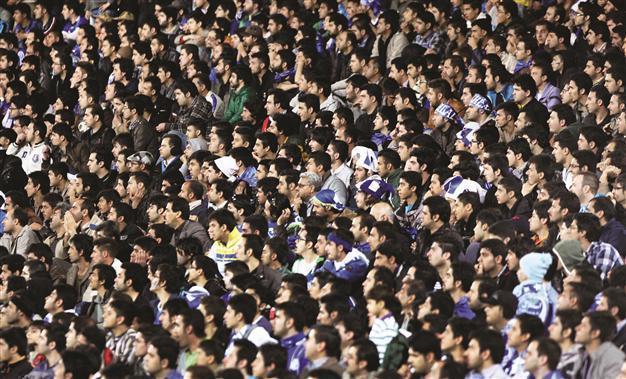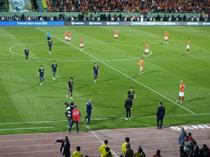Iran feels psychological impact of international sanctions, isolation
James M. DORSEY Hürriyet Daily News

Iranian fans are seen following a football match of Esteghlal from Iran and Al Ain from the United Arab Emirates in Asian Football Confederation Champions League, at the Azadi stadium in Tehran, Iran, in this March 13 photo. AP photo
Struggling to maintain its place in Asia’s top tier, Iranian football is a reflection of a country laboring under the burden of a repressive political regime and not only the economic but increasingly also the psychological effect of international isolation and punishing sanctions.The psychological wear and tear is universally visible. Iranian President Mahmoud Ahmadinejad, a football fan who has unsuccessfully tried to tie football to his waning political bandwagon in part because of his encouragement of political interference in the game and his failure to invest in grassroots development and modernization, last October chided the national team for lowering its ambitions.
“If you think that you are only good enough for Asia, then that is what you will be and will remain,” Mr. Ahmadinejad said.
The politics of football were further highlighted last month when a court sentenced three businessmen and a banker linked to Mr. Ahmadinejad to death in a $2.8 billion fraud case involving the acquisition of football clubs and steel factories as well as the establishment of a private bank. The case was widely viewed as part of a power struggle in advance of presidential elections in June in which Mr. Ahmadinejad constitutionally cannot stand for a third term but is trying to ensure that one of his allies wins the poll.
“My experience as the national team manager of Iran was that football plays a major role in the political, social and even economic direction that the nation takes and the people who decide the direction of the country are constantly using the game for their political agenda. There are pluses and minuses to it all. The government’s financial resources support the game, but it becomes politically manipulated,” said former Iranian national coach Afshin Ghotbi in a recent interview with Al Jazeera. A recent visit to Iran at the invitation of an institute affiliated with the Foreign Ministry illustrated the psychological toll of the country’s isolation and sanctions imposed on it by the international community in a bid to force it to concede to international supervision of its nuclear program. The toll expressed itself in the regime’s pervasiveness, its fear-inspired penchant for control, a preference among officials for monologue rather than dialogue and a dread of foreigners reminiscent of the former Soviet Union and North Korea.
The impact was on full display at an international conference on geopolitics in the Gulf in the southern Iranian city of Bandar Abbas. Speakers there continuously played up Iran’s role as a regional power, the strategic geography of Shiite Muslims in oil and water-rich parts of the Gulf, the discrimination suffered by Shiites in countries like Saudi Arabia and Bahrain and the alleged subservience to the United States of wealthy Gulf states who blame Iran for stirrings of unrest within their own borders.
Foreign Ministry officials and think tank figures associated with the ministry used their role as moderators to rudely cut foreign speakers short so that they could embark on a drumbeat of lengthy, highly politicized and ideological speeches. The degree of control became further obvious when several foreign participants who ventured into town on a shopping spree were intercepted by security officials allegedly for their own protection.
Sports journalists in fear
Foreigners are not the only ones to run afoul of the regime’s suspicions and bunker mentality. Iranian sports journalists refused to meet with a visiting foreign scholar, saying they feared being hauled in by the security service.
Ahmad Shaheed, the United Nations’ monitor for human rights in Iran, warned in a report this week that the crackdown was intended to stymie potential protests linked to the upcoming election. Iran brutally suppressed protests in the wake of its 2009 presidential election.
Mr. Shaheed as well as Iranians said 17 journalists had been arrested in January in addition to some 50 who were already behind bars. “They have been charged with communicating with international news organizations or communicating with human rights organizations, both of which should be protected under law rather than being penalized,” Mr. Shaheed said.
Mr. Shaheed’s report that was denounced by Iranian officials who have refused to let him visit Iran also highlighted violations of the rights of women and ethnic and religious minorities. The regime nevertheless appears to be trying to soften its crackdown with a more liberal attitude towards women’s public appearance.
















